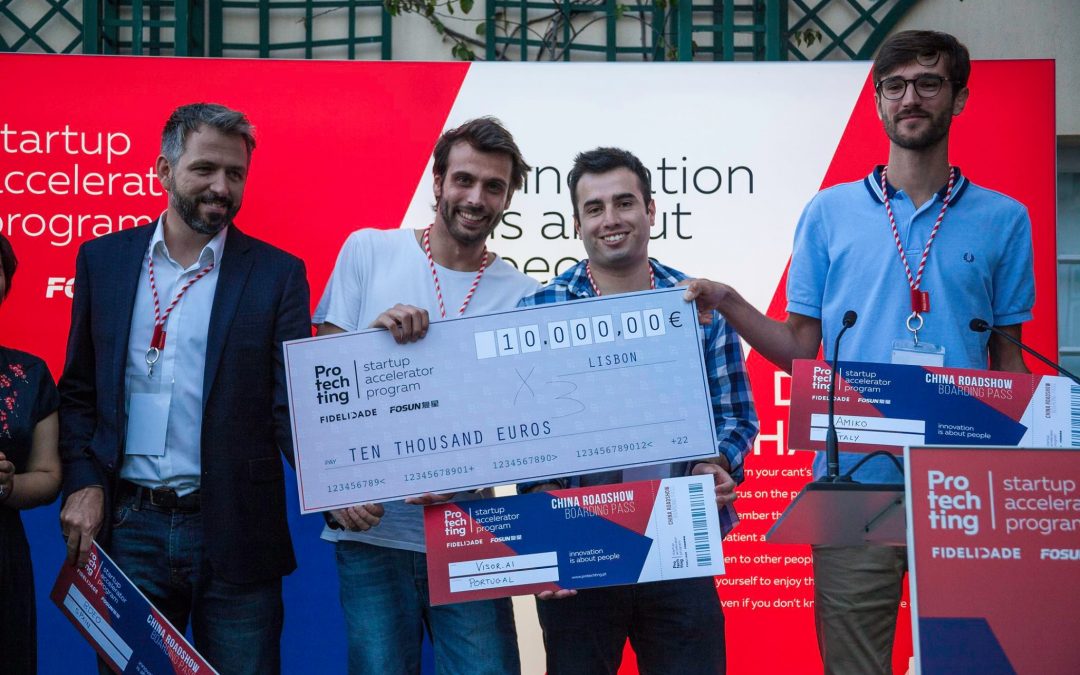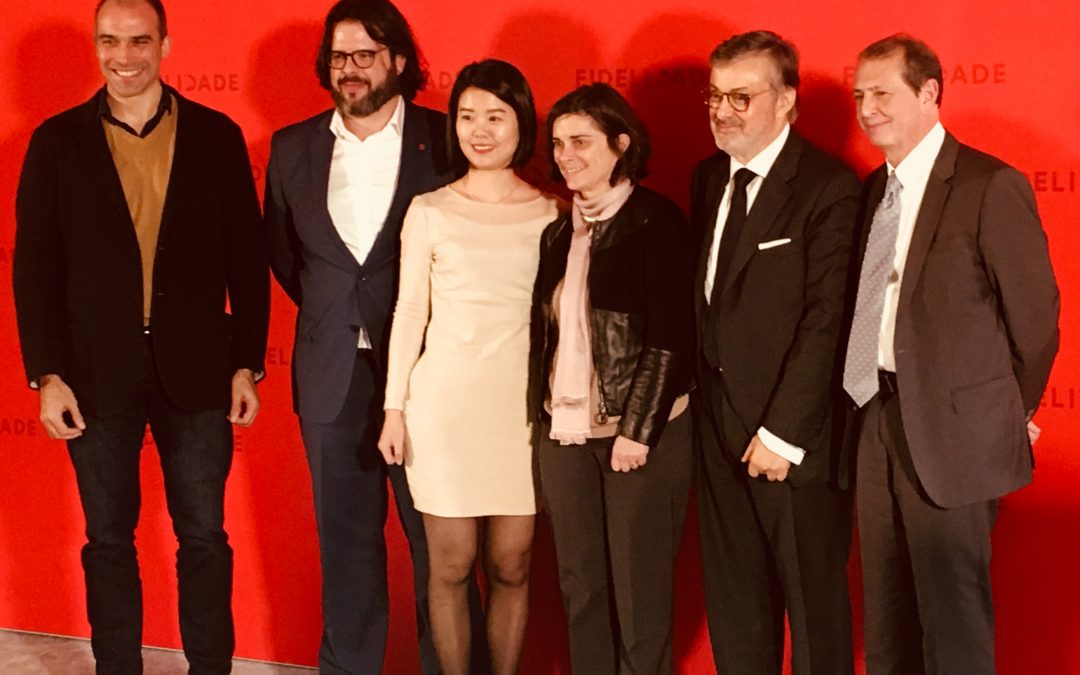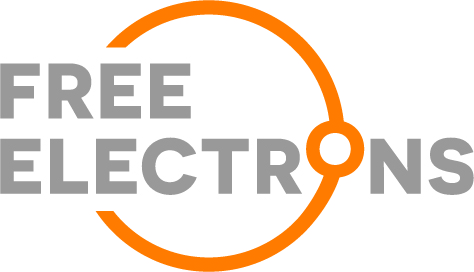
by Carolina Santos | Mar 21, 2018 | Startups
Last time I wrote about Protechting I mentioned that last year instead of one winner, there were three. Visor.ai was one of them, they won 10.000 euros and traveled to China and between all this they made business that lasts until today.
Gonçalo Consiglieri, Visor.ai Co-founder, said that unlike other programs he has participated in, Protechting is very focused on people, making it easier for startups to arrange meetings with the partners who are all very involved and willing to hear from them.
When Visor.ai entered the program their solution wasn’t quite ready yet, there were some changes to be made and the program ended up challenging them to develop their product according to a client’s real needs. All this in one week during the bootcamp and 2 or 3 months for the pilot.
The importance of a bootcamp was also underlined by Gonçalo. It is a fact that nowadays pretty much all programs have a bootcamp but if we go one or two years back that wasn’t the reality. The bootcamp helps both sides, the partners side and the startups side. It’s not only the partners who use the bootcamp as a barometer to see if there’s a fit with startups, the other way around also applies. Startups can also understand in the course of a week if their solution can be valuable to the partners, but more than that startups get to grow and adjust their product and for some of them that’s what’s most valuable.
It’s been a year since Visor.ai won Protechting’s last edition and now they have another project with Fidelidade besides the initial one. The one they’re focused right now is related with their website and how to better get leads. After one year, the three winner startups are also still friends with each other. Hard to say if it was the bootcamp or the China trip who bond them, or probably it was both, truth is it remains until now. And I mean they actually stay at each other’s places when they go to their countries and help each other on their solutions, so it’s not a fake friendship.
Asked if Protechting changed them and their business, Gonçalo says that they’ve definitely changed and thanks to the programme they’re now developing features they wouldn’t think about if it weren’t for Fidelidade. Actually now they only develop what their clients ask for and stopped wasting time developing stuff just because they thought it was cool.

by Carolina Santos | Mar 14, 2018 | Startups
Fidelidade and Fosun launched the third edition of the startup acceleration programme – Protechting -, which aims to support the development of international projects that contribute to improve the protection of people in three strategic areas – Healthtech, Insurtech and Fintech.
Just like the other two editions, this third one will also be developed with the support of Beta-I, also with recently reinforced valences, allowing it to contribute in an even more efficient way to the innovation ecosystem.
As a result of the first 2 editions of this Open Innovation incentive programme, 6 startups, from 4 different countries, still maintain cooperation with Fidelidade Group and with Luz Saúde, contributing to the creation and implementation of innovative solutions.
This third edition is devoted to the promotion of international entrepreneurship and will present some innovations. Luz Saúde will reinforce its participation in the programme, and the German private bank Hauck & Aufhäuser, owned by Fosun Group, will integrate this project for the first time, seeking to attract technological innovation for financial services through Fintech.
The main goal is still to find more consistent startups to the programme and in order to do that international scouting initiatives will happen during the application phase, with partner entities and at entrepreneurship events specifically dedicated to Insurtech and Fintech, in London, São Paulo and Silicon Valley. The programme will also be presented during Startup Europe Week, taking place in Brussels, between May the 5th and 9th. Showing how far this programme has come and how much it grew.
The excitement among partners is understandable, not only because there’s new companies participating but also because every year they are able to reach more countries. And that is one of the reasons why it’s increasingly positioning itself as an internationally renowned acceleration programme.
Last year three startups were selected on the Pitch day and later went to China to participate in Protechting | Innostar. The good thing about this is that initially only one startup was meant to be selected to go to China, but they liked all three so much they couldn’t choose. So, we never know what might happen this year.

by Carolina Santos | Mar 8, 2018 | Startups
In the wake of Free Electrons closing its applications it’s time to speak numbers. The first global energy startup accelerator program that connects the world’s most promising smart energy startups with leading utility companies was a success. And the reason why it was a success is because everybody worked as a team, there were no time differences there was only hard-work.
515 startups from 65 countries applied to the program. From these 84 are from the United States of America, the most represented country, 30 from Brazil and 29 from India, closing the top 3. Australia had 24 applications, Spain, United Kingdom and Germany all had 23 and Portugal 14.
Luís Manuel, Executive Board Member of EDP, said “We couldn’t be happier with the applications process. The bar was set very high with 451 applications so we are very pleased to have exceeded that number. Also, 72.1% declared that they are not currently in a fundraising process, a fact that speaks to the overall maturity of the candidates. We believe that this is critical, as we are looking for innovative solutions, that can be adopted and integrated in our companies, and not only fresh ideias”.
When the program was launched the focus was clean energy, smart grids, energy efficiency, management and access, e-mobility, customer solutions and business models and the success of a program is also measured by the startups that apply and if they are a good match and looking at the numbers there are reasons to celebrate – 22% from Clean Energy, 15% IoT and Digitalization, 12% Energy Efficiency and 7% Smart Grid.
Manuel Tânger, Co-Founder & Chief Open Innovation Officer at Beta-i, believes “Free Electrons is all about harnessing potential and generating innovation, while learning in that process! This is a great opportunity for utilities from 8 different geographies to come together and create something unique, tapping into the power that startups are already generating in several different industries. For us, it’s a unique chance to demonstrate, yet again, our vision of how innovation will stem from partnerships between startups & corporates, and how it will become the new normal”.
Last year’s edition, generated an overall financial value of contracts signed between the 12 startups and the 8 utilities of about 2 million dollars, with a pipeline of ongoing opportunities surpassing 12 million dollars. The future is unknown but we’re all about exceeding numbers.

by Carolina Santos | Mar 7, 2018 | Investors, Startups
Last week we’ve announced some of the speakers coming to this year’s Lisbon Investment Summit, a list that is going to grow and is going to be released slowly like the band’s announcements from a Summer Festival.
One of the speakers is Jenny Fielding, Managing Director at Techstars, Adjunct Teacher at Columbia and also an Investor. It’s the first time she’s coming to LIS and I had the privilege to talk a little bit with her about her career, women in tech, investments and tips for startups to get acquainted with investors.
Read the whole interview below and make sure you register here for the Lisbon Investment Summit 2018, on June 6-7.
I know you’ve studied Law, how does a lawyer become a Managing Director at Techstars?
I had a rambling career which has taken me through many iterations of myself so after I went to Law School I did a brief stunt in Legal and ended up in Finance where I worked at J&P Morgan. While I was there I developed a concept for a startup, the idea was based on a need that I had personally and I ended up joining forces with two technologists and starting a company. It was the highlight of my life and the hardest thing I’ve ever done.
What are the challenges women face in tech and venture?
The framework of my life and career has never been that anything would hold me back and I never really put my career in that light of gender. However, women are subjected to bias more regularly in tech mostly because we’re minorities, the thing that you really have to look out for is the unconscious bias because it’s more endemic and we have to be very aware of as we’re building companies that don’t necessarily have gender parity.
You’re also an investor and you’ve already invested in a portuguese startup, right? How did it happen?
It’s right. They’re a great company in Lisbon called Muzzley and were pretty much pioneers of consumer IoT. I was introduced to them as they were thinking about what their international expansion would be and also what their B2B and industrial footprint would be. And the program I was running at the time was focused on industrial IoT so it was a great fit.
Do you keep in contact with the startups you’ve invested in?
Yes, 100%. Any investors commitment when they invest in a company is to be with them for life and we know the venture cycle is at least 10 years so when you make an investment it’s a long term commitment. And that’s what’s really exciting, you’re building a long relationship.
Could you give us any tips on how to build relationships to win?
Entrepreneurs think about what’s right ahead of them, they’re very tactical, it’s like “I need to raise money so I’m going to call some VC’s”, but what you really need to do is develop relationships and those relationships can take months and years to build. I definitely recommend that startups that aren’t even thinking about raising money start getting acquainted with the investor community and really start getting to know those people as people, because that’s really how we invest in the early stage, we’re looking for signals based on people and less based on product or technology. It’s never too early.
We now come across startups looking for 6 million rounds without a previous investment, which was rare a couple of years ago. Did ambition grow or the market changed?
It’s ambitious but some verticals require more capital, something like energy, for example, especially if there’s going to be a hard work component or an industrial component can definitely take more capital. But I think what we’ve seen as a successful cadence is that companies raise capital in sequence and they’re able to hit milestones. That’s one of the things we help with at Techstars and through my investing career is “how much can you do with how little?” You start with a little amount, get to the next milestone and then think about your next raise as opposed to going out to the market just trying to raise a massive number. It used to be your friends and family (money) and then series A and now we’re seeing probably three rounds in between that.
I read this article on Crunchbase that said that startups keep choosing bad names, does it have an influence?
At the end of the day if you have a great product that’s gonna win, but I think startups and founders get discouraged because they’re looking for the perfect URL. I always say: base your company on the name that really resonates with you and worry about the domain later because there’s always ways to solve through that, so find the name that really represents you, your product, your vision, what you stand for and go from there.
What are the Venture Capital investments in 2018?
I think we’ll see more on Autonomous that’s obviously tight in to AI and I don’t think that’s going away anytime soon, Healthcare is an area that’s really starting to step up and take the reins on, those are the two areas we’re going to see more of. Also, we’re hearing a lot about Spacetech, for a long time that was something that was pretty expensive, but now there’s a lot of interest in it so we’re going to see more areas around that.
What do you think about Lisbon Startup Scene?
I visited in December for the first time in quite a while and I was just blown away by what was going on there, just in terms of all the different types of companies, the different verticals, the different resources that are available, the government incentives, the capital that is coming in. It’s following a similar pattern that I saw with Berlin and it’s so exciting so I can’t wait to spend more time and really dig in the summer.
If an entrepreneur wants to reach out to you at Lisbon Investment Summit what do you recommend?
They should just contact me directly, come grab me on the panel or tweet to me on Twitter (@jefielding). I think that’s what’s so great about conferences outside my hometown, it’s a great opportunity to have some one-on-one time with people that you may not be able to get to all the time. I look forward for that.
Want to have some one-on-one time with Jenny? The make sure you register here and join us for another edition of the Lisbon Investment Summit this June 6-7.

by Carolina Santos | Feb 23, 2018 | Corporates, Investors, Startups
So many icons have talked about failure and still it’s the biggest deal there is. Johnny Cash said: “You build on failure. You use it as a stepping stone. Close the door on the past. You don’t try to forget the mistakes, but you don’t dwell on it. You don’t let it have any of your energy, or any of your time, or any of your space”. Icons talked about it, people quoted, maybe even wrote it on Facebook and immediately forgot when they saw someone failing.
Back in 2013, Ekaterina Walter, a contributor for Forbes wrote that “it seems that failure tends to be more public than success.” And she is right, it’s not a matter of perception, when people are successful they’re untouchable, people don’t speak a lot about them out of respect, but when everything goes south people become an easy target, the backlash is totally out of proportion. It looks like everyone who never tried feels free to criticize, to say they’d do better – again, they never tried -, they laugh at their misfortune, but it’s actually hiding something deeper. Their fear of trying.
No one is to blame for this reactions and everyone is to blame for this reactions. For centuries society has condemned failure, if you fail at school you’re no good, you’re not intelligent enough, you’re not going far. Teachers say it, parents say it, friends say it and enemies say it. It’s still a part of our culture, a demanding culture averse to flaws.
According to Marco Ermidas, anthropologist working at Beta-i, “society in general has an extreme difficulty in dealing with what’s negative or isn’t pretty enough, the flaw is always pointed out”, adding that “the future expectations and the need to be an overachiever also helps adding pressure”.
The biggest problem with failure is that not everybody reacts to failure the same way and it can actually take a toll on people. The embarrassment caused by it can lead to depression. But of course no one thinks about that when they’re comfortably sitting on their couches playing judge.
Also, when asked about how society saw women’s failure, Marco said that “it makes a difference to be a woman, men are more easily forgiven and society believes it’s almost certain they’ll succeed again in the future, while women do not have that benefit of the doubt, it’s harder to forgive a woman’s failure”.
The same can be applied to startups. People look at startups as a trend led by a group of entitled kids who have nothing better to do with money so decide to have a startup and not happy get money from the government that could be used on other things. What follows? Backlash.
How to overcome failure?
Even if you don’t fail, but you happen to be on the same business that someone failed recently, you’re going to be a failure, because people will make a general assumption by inferring from a specific case. So, you too should be prepared.
Marco believes that failure is like grieve, you have to go through all different stages: denial, anger, bargaining, depression and acceptance. Because losing something you’re very fond of is exactly the same as breaking up, for example. You’ve been through break-ups and you know that it takes time.
Never, not even for a second, blame yourself. Something might have failed but that doesn’t make a loser out of you. It’s not a death sentence it’s a bump in the road.
And finally but not less important: face failure, embrace it, admit it, speak about it. Better yet, make fun of it and learn from it. If you need inspiration to do it – let’s hope you never have to – read this farewell post from a startup.





